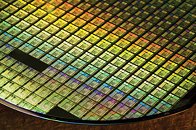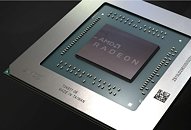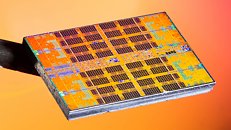Raevenlord
News Editor
- Joined
- Aug 12, 2016
- Messages
- 3,755 (1.25/day)
- Location
- Portugal
| System Name | The Ryzening |
|---|---|
| Processor | AMD Ryzen 9 5900X |
| Motherboard | MSI X570 MAG TOMAHAWK |
| Cooling | Lian Li Galahad 360mm AIO |
| Memory | 32 GB G.Skill Trident Z F4-3733 (4x 8 GB) |
| Video Card(s) | Gigabyte RTX 3070 Ti |
| Storage | Boot: Transcend MTE220S 2TB, Kintson A2000 1TB, Seagate Firewolf Pro 14 TB |
| Display(s) | Acer Nitro VG270UP (1440p 144 Hz IPS) |
| Case | Lian Li O11DX Dynamic White |
| Audio Device(s) | iFi Audio Zen DAC |
| Power Supply | Seasonic Focus+ 750 W |
| Mouse | Cooler Master Masterkeys Lite L |
| Keyboard | Cooler Master Masterkeys Lite L |
| Software | Windows 10 x64 |
TSMC is on the vanguard of chipset fabrication technology at this exact point in time - its 7 nm technology is the leading-edge of all large volume processes, and is being tapped by a number of companies for 7 nm silicon. One of its most relevant clients for our purposes, of course, is AMD - the company now enjoys a fabrication process lead over arch-rival Intel much due to its strategy of fabrication spin-off and becoming a fabless designer of chips. AMD's current product stack has made waves in the market by taking advantage of 7 nm's benefits, but it seems this may actually become a slight problem in the not so distant future.
TSMC has announced a threefold increase in its delivery lead times for 7 nm orders, from two months to nearly six months, which means that orders will now have to wait three times longer to be fulfilled than they once did. This means that current channel supplies and orders made after the decision from TSMC will take longer to materialize in actual silicon, which may lead to availability slumps should demand increase or maintain. AMD has its entire modern product stack built under the 7 nm process, so this could potentially affect both CPUs and GPUs from the company - and let's not forget AMD's Zen 3 and next-gen RDNA GPUs which are all being designed for the 7 nm+ process node. TSMC is expected to set aside further budget to expand capacity of its most advanced nodes, whilst accelerating investment on their N7+, N6, N5, and N3 nodes.



View at TechPowerUp Main Site
TSMC has announced a threefold increase in its delivery lead times for 7 nm orders, from two months to nearly six months, which means that orders will now have to wait three times longer to be fulfilled than they once did. This means that current channel supplies and orders made after the decision from TSMC will take longer to materialize in actual silicon, which may lead to availability slumps should demand increase or maintain. AMD has its entire modern product stack built under the 7 nm process, so this could potentially affect both CPUs and GPUs from the company - and let's not forget AMD's Zen 3 and next-gen RDNA GPUs which are all being designed for the 7 nm+ process node. TSMC is expected to set aside further budget to expand capacity of its most advanced nodes, whilst accelerating investment on their N7+, N6, N5, and N3 nodes.



View at TechPowerUp Main Site







